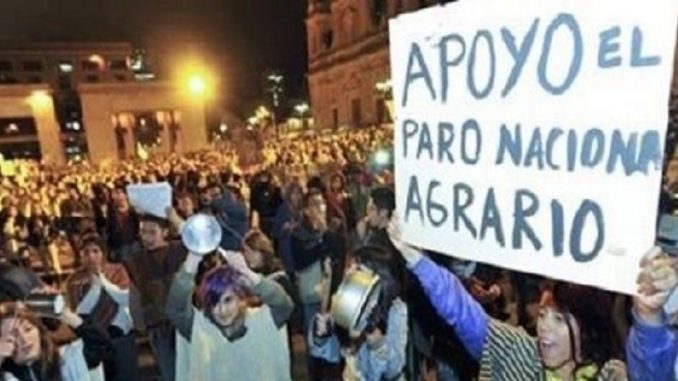
THE AGRARIAN WORKING REGIME IS DEROGATED
By Alberto Giovanelli
Today, December 5, six days have passed since the beginning of a new process of struggle that moves Peru and that seems to have culminated in the last few hours with an overwhelming triumph for the workers when the Congress abolished the Promotion of Investments in the Agrarian Sector Act.
The strike in the region of Ica, to the south of the country, which blocked the Pan-American Highway, the main land access that connects Lima, has costed the lives of two workers as a result of the police repression and was begining to produce, among other consequences, the first symptoms of shortages in the capital of the country.

After the institutional crisis in November, the succession of three presidents in one week, the new transitional government of Segasti has to face a strong process of mobilization that has reached sectors of health, schools, universities and now agro-industrial workers.
We must differentiate agricultural work from agro-industry. The agro-industry is manufacture and thus it must be in the general regime of the workers and, despite that, still has a special regime that benefits the business sector.
The agro-industrial sector of Peru is composed of most of the companies that own farmland and spaces where agricultural products are processed and packed. The workers of those companies are the ones who have carried out the strike.
Workers demanded the derogation of the Legislative Decree 653, the Promotion of Investments in the Agrarian Sector Act, since they live in a situation of exploitation with that norm, their social benefits and rests are omitted and water is even denied to them.
In this fight, the confrontation of two processes that have been in the country for years was reflected. On the one hand, we have the constituent process of 1979 which reaffirmed the agrarian reform promoted by the struggles of the 1960’s. On the other, we have the constitution of Fujimori of 1993 which simply erased any reference to the agrarian reform.
By issuing the Legislative Decree 653, the Promotion of Investments in the Agrarian Sector Act, which enabled latifundium and has caused that companies like Grupo Gloria now own 60,000 hectares in the cost of Áncash and La Libertad; Grupo Romero more than 20,000 hectares in Piura, Huaral and San Martín; Grupo Dyer (Composol) around 24,000 hectares in the valleys of the coast; Grupo Oviedo 20,000 hectares; Grupo Wong 17,000 hectares; Grupo Chlimper 4,4 thousand hectares; plus dozens of neolatifundiums that have more than a thousand hectares and with the voracity of accessing almost 150,000 hectares of new public land, recovered in the coast with the new irrigations made with State funds. These are essentially the companies where the strikers work.
The same Fujimorist regime, backed by the Constitution of 1993, which protects the freedom of enterprise and the freedom of contract, imposed the 27360 Act – “Agrarian Promotion Act” , promoted by the former Fujimorist minister of agriculture Chlimper, canceling the social benefits of more than 270,000 workers.
Despite many prerogatives held by the agro-industrials and with millions of savings generated in their favor, businessmen still claim that increasing the salaries of the agrarian workers is something negative, as manifested by Pedro Olaechea Álvarez-Calderón, businessmen and former president of the Congress, who said that “If we say 850 soles, it is a lot inside Peru, here [in Lima] may be little.” This was a point of view shared by the corrupt former President Martín Vizcarra, who promulgated the Urgency Decree 043-2019, renewing the term of the agrarian regime and benefiting with more “savings for the businessmen” till 12/31/2031.
With their agrarian strike, the rural workers, besides demanding the derogation of the decree, the restitution of their labor and social rights, join the massive demand of the Peruvian people for the derogation of the Fujimorist constitution of 1993 and for the opening of a free and sovereign constituent process that allows discussing and addressing the measures that the workers and the people need.
It has been essentially important to surround with solidarity our comrades in the conflict in ICA, La Libertad, etc. and that is why the comrades of the International Socialist League of Peru join the campaign of support to multiply the efforts and contribute to the triumph of the agrarian strike that will surely be a hard blow to the continuist plans of Sagasti and the business sector as a whole.








